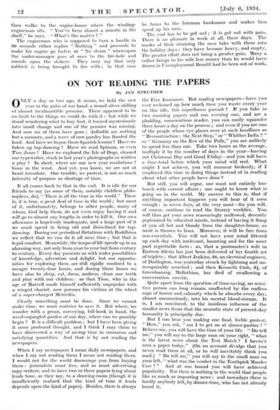ON NOT READING THE PAPERS
By JAN STRUTHER
It all comes back to that in the end. It is idle for our friends to say (as some of them, notably childless philo- sophers, do), " There is all the time in the world." There is, it is true, a great deal of time in the world ; but most of it, unfortunately, belongs to other people, many of whom, God help them, do not even enjoy having it and will go to almost any lengths in order to kill it. Our own allowance is hopelessly inadequate, and a large part of it we must spend in being old and disinclined for tap- dancing. During our periodical flirtations with Buddhism we reflect that we can do it all next time ; but that is tepid comfort. Meanwhile, the tempo of life speeds up in an alarming way, not only from year to year but from century to century. Every day presents us with wider possibilities of knowledge, adventure and delight, but our opportu- nities for exploring them are still rigidly confined to a meagre twenty-four hours, and during those hours we have also to sleep, eat, dress, undress, clean our teeth and play with our children : so that Time, who in the age of Marvell made himself sufficiently unpopular with a winged chariot, now pursues his victims at the wheel of a super-charged Mercedes.
Clearly something must be done. Since we cannot make time, we must contrive to save it. But where, 'we wonder with a groan, surveying, bill-hook in hand, the weed-enjungled garden of our day, where can we possibly begin ? It is a difficult problem ; but I have been giving it some profound thought, and I think I may claim to have discovered a way of saving time in enormous and satisfying quantities. And that is by not reading the newspapers.
When I say newspapers I mean-daily newspapers, and when I say not reading them I mean not reading them. I would not for the world discourage you from buying them : journalists must live, and so must advertising copy-writers, and to have two or three papers lying about lends tone, as they say, to a drawing-room (though it is insufficiently realized that the kind of tone it lends depends upon the kind of paper). Besides, there is always the Free Insurance. But reading newspapers—have you ever reckoned up how much time. you waste every year on this idle, this superfluous pursuit ? If you take in two morning papers and one evening one, and are a plodding, conscientious reader, you can easily squander three hours a day on the process ; and even if you are one of the people whose eye glazes over at such headlines as " Reconstruction : the Next Step," or " Whither India ? " or " Germany on the Eve of the Polls," you are unlikely to spend less than one. Take two hours as the average, multiply it by the number of days in the year—leaving out Christmas Day and Good Friday—and you will have a time-total before which your mind will reel. What might I not achieve, you will murmur brokenly, if I employed this time in doing things instead of in reading about what other people have done ?
But still, you will argue, one must not entirely lose touch with current affairs ; one ought to knoiv what is going on in the world. My answer to this is, that if anything important happens you will hear of it soon enough : in seven days, at the very most—for you will, of course, continue to read the literary weeklies. You will thus get your news reassuringly mellowed, decently peptonized by educated minds, instead of having it flung at you all hot and bloody from the slaughter-house, as meat is thrown to lions. Moreover, it will be free from non-essentials. You will not have your mind littered up each day with irrelevant, haunting and for the most part regrettable facts : as, that a postmaster's wife in Eastern Silesia has just been delivered of her fourth set of triplets ; that Albert Jenkins, 38, an electrical engineer, of Darlington, was yesterday struck by lightning and un- recognizably scorched ; and then Kenneth Cosh, 3i, of Greenloaning, Midlothian, has died of swallowing a conversation sweetie.
Quite apart from the question of time-saving, no sensi- tive person can long remain unaffected by the endless saga of horror and calamity which he absorbs every day, almost unconsciously, into his mental blood-stream. It is, I am convinced, to the insidious influence of the smaller news items that the neurotic state of present-day humanity is principally due.
But I can hear you making one final, feeble protest. " How," you ask, " am I to get on at dinner-parties ? " Believe me, you will have thetime of your life. " Do tell me," you will say to the large man on your right, " what is the latest news about the Test Match ? I haven't Seen a paper today." (On no account divulge that you never read them at all, or he will inevitably think you mad.) " Do tell me," you will say to the small man on your left, " what was the verdict in the Toothpick Murder Case ? " And at one bound you will have achieved pppiilarity. For there is nothing in the world that people like so much as imparting news : and nowadays there is hardly anybody left, by dinner-time, who has not already heard it.










































 Previous page
Previous page